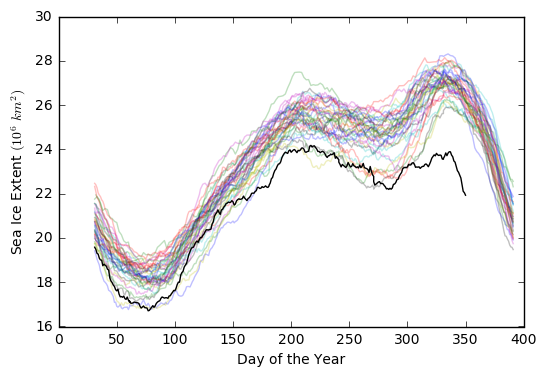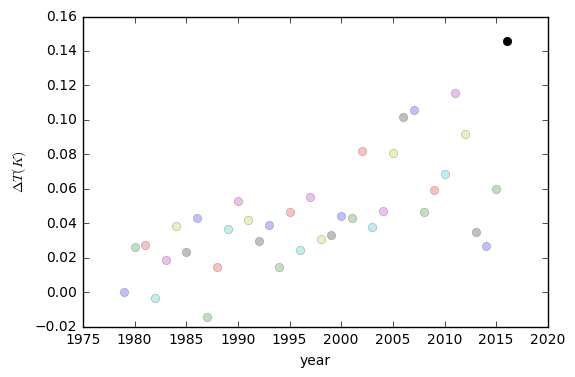Disappearing Sea Ice
A recent series of tweets have been reporting the disappearance of sea ice and the record low in global sea ice. It was mainly spurned on by the graph in the tweet below showing an extreme low in the global sea ice levels:
This is a graph of total global sea ice. The red line is this year. Something is very very wrong. pic.twitter.com/joFRACczPk
— Bill McKibben (@billmckibben) November 19, 2016
This is such a drastic change that I thought that something must be wrong. Fortunately, all of the data is available, so one can download and look at the data. Now, while on the individual plots of the artic or antartic see ice , it does not look so dramatic, but in both hemispheres, the sea ice is significantly below the seasonal average. This makes the combined data stand out pretty significantly.

This could just be a confluence of events in terms of bad weather in the artic and a warm season in the antartic, but when combined with longer term trends, it is fairly concerning. There is a pretty high yearly variation in the sea ice and this year, it so happens that both places are significantly lower than the average. The October measurements are both below the mean values. If these are two independent measurements, the probability of that happening randomly is approximately one in two hundred.
Nonetheless, there is a long term trend over the last thirty years that the global sea ice has been decreasing. For me, one thing that is scary about this is the accompanying decrease in albedo (reflectivity of the Earth) due to the loss of sea ice. The ocean only reflects about 6% of the light incident on it, whereas sea ice typically reflects 60% of the light. This measns without the sea ice covering it, the oceans are absorbing much more light and will increase in temperature accordingly, modulo any other changes in the atmosphere.
And this for me is the scary bit, where part of the feedback process of the lost in sea ice results in warmer temperatures. The more sea ice that is loss, the more energy the Earth absorbs, and the warmer the temperatures. A simple model with conservative assumptions in the change in the Earth’s temperature due to its change in albedo, would put the increase at around a 0.1 degrees over the last thirty years just due to the loss of sea ice and no other effect. Nonetheless, the Earth looks to absorb significantly more solar energy this year unless there are other effects (such as increased cloud cover) modulating the amount of solar energy absorbed.

